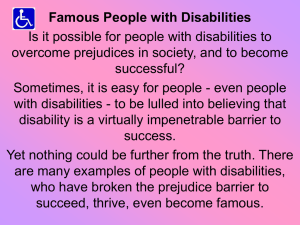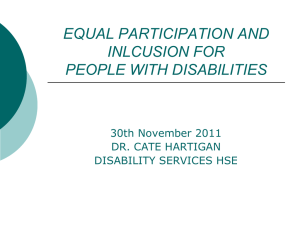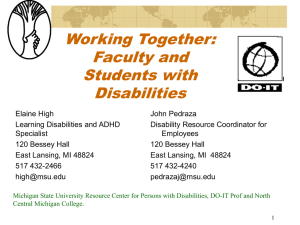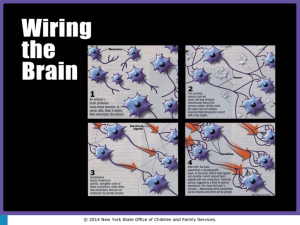Support and Employment in the Netherlands for persons with
advertisement
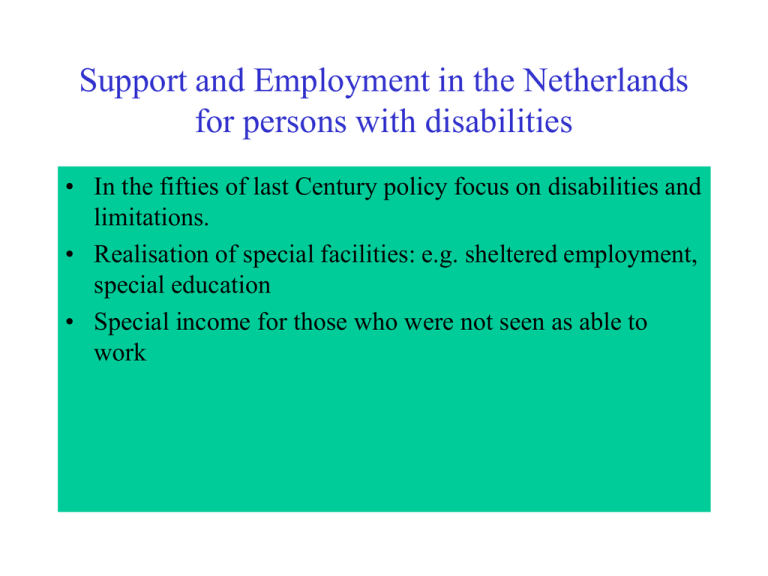
Support and Employment in the Netherlands for persons with disabilities • In the fifties of last Century policy focus on disabilities and limitations. • Realisation of special facilities: e.g. sheltered employment, special education • Special income for those who were not seen as able to work Support and Employment in the Netherlands for persons with disabilities • Objectives sheltered employment: • creation of work for persons, who were not eligible for work in the open labour market, in special settings (workshops) • stimulate and prepare persons who are working in the sheltered workshop to gain a job in the open labour market • (idea was that with training and guidance possibilities could be created in the open labour market) Support and Employment in the Netherlands for persons with disabilities • Numbers people working in sheltered workshops were growing every year. • Rising of costs. • Budget control with limitation: • max 98.000 persons x € 25.000: • total costs 2011: round € 2.500.000.000 • 2007: more than 97.000 persons working in/from sheltered workshops • 2008: 15.000 persons on the waiting list Support and Employment in the Netherlands for persons with disabilities • Disability allowance. Related to percentage of disability for work. • Full disability allowance in a situation of more than 80% of disability for work. • The hight of the allowance was also linked to the formal job a person had. • Disabled persons who never had a job received a minimum Support and Employment in the Netherlands for persons with disabilities • Growth of number of persons on a disability allowance: • 2008: 938.000 persons • The total number is reducing due to limitations of entrance in the system. • Number of young disabled persons (Wajong) : • 2007: 155.000; 2008: 167.000. • Unchanged policy: numbers shall rise to 200.000 - 300.000 Support and Employment in the Netherlands for persons with disabilities • Supported Employment: • Started in the beginning of the eighties in the USA. • Some projects in the UK and Italy (Milan) strong focus on systematic instruction. • Strong development since end eighties and beginning of the nineties with the Open Road project from St Michaels House in Ireland Support and Employment in the Netherlands for persons with disabilities Start of many projects and the establishment of national association of supported employment in different European countries. Establishment of the European Union of Supported Employment (EUSE) in 1993. Establishment of the World Association for Supported Employment (WASE) 1995. Support and Employment in the Netherlands for persons with disabilities • Effect of supported employment is change in mind set. Persons with disabilities were seen as able persons who need support related to their diasbility. • Work in the open labour market became a real option. Support and Employment in the Netherlands for persons with disabilities • Netherlands start of Supported Employment beginning of the nineties with small projects. • Persons with disabilities gained jobs in the open labour market through the support system from supported employment. • Funding from European Social Fund • Persons with a disability were able to get a job in the open labour market who dit not fulfill the entrance criteria for the sheltered workshops. Support and Employment in the Netherlands for persons with disabilities • Support provision: individual support through job coaching; training on the job; on going support. • Lower productivity: less payment e.g. productivity 60%; employer pays 60% of normal wage; persons with a disability receives additional allowance till 100% of minimum wage. • Compaired to costs on sheltered employment and disability allowance: supported employment is more cost effective Support and Employment in the Netherlands for persons with disabilities • Government policy. Nowadays: More attention for work in the open labour market. • Sheltered workshops can also provide supported employment and placements in the open labour market. • Work first approach: when work is a possibility it goes first; disability allowance only when work is not an option. • Changes in the law related to sheltered work: communities have more responsibility. A job or study must be provided if possible,. Support and Employment in the Netherlands for persons with disabilities • Recent changes related to young schoolleavers. No Wajong (disability allowance for young schoolleavers) in the age between 18 and 27. • Municipalities must provide to these young people a job or a training, or a combination of both. • Individual tailored approach

